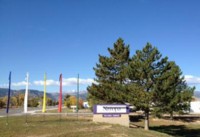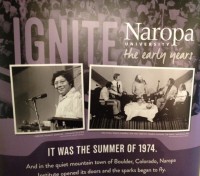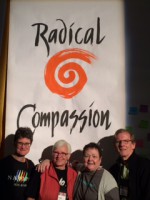Radical Compassion: A Report from Naropa’s 40th Anniversary
Imagine my surprise and delight to run into Jayne Sutton in Boulder, Colorado last month in the hallways of Naropa University. We had both come to participate in a symposium celebrating Naropa’s 40th anniversary. I was on home leave from my job in Vietnam, and Jayne was there with Rich Ann and Ariana Baetz and Sharon and Ada Doetsch-Kidder, from the DC Shambhala Center.
 As many of you know, Naropa is the only accredited Buddhist University in the U.S. and was founded by Chogyam Trungpa Rinpoche. It grew out a summer event Trungpa organized in 1974 in Boulder, where he had been invited to live and teach shortly after his arrival in the U.S. His idea was to create a place where the contemplative practices of Buddhist monastic education could be joined with the rational approach of western academia. It is named after the eleventh-century Indian sage in the Kagyu lineage that Trungpa was part of. Photos and films from that summer show a definite “summer of love” vibe, with throngs of long-haired hippies sitting cross-legged on the floor to hear Trungpa and Ram Dass and other luminaries hold forth about meditation, samsara, and nirvana.
As many of you know, Naropa is the only accredited Buddhist University in the U.S. and was founded by Chogyam Trungpa Rinpoche. It grew out a summer event Trungpa organized in 1974 in Boulder, where he had been invited to live and teach shortly after his arrival in the U.S. His idea was to create a place where the contemplative practices of Buddhist monastic education could be joined with the rational approach of western academia. It is named after the eleventh-century Indian sage in the Kagyu lineage that Trungpa was part of. Photos and films from that summer show a definite “summer of love” vibe, with throngs of long-haired hippies sitting cross-legged on the floor to hear Trungpa and Ram Dass and other luminaries hold forth about meditation, samsara, and nirvana.
 Trungpa, himself an artist and poet, also attracted the likes of Alan Ginsberg, William Burroughs, John Cage, and Gary Snyder to Boulder. He asked Ginsberg and Anne Waldman to found a poetics department at Naropa during the first summer session, and the Jack Kerouac School of Disembodied Poetics was borne. It lives on as part of Naropa today.
Trungpa, himself an artist and poet, also attracted the likes of Alan Ginsberg, William Burroughs, John Cage, and Gary Snyder to Boulder. He asked Ginsberg and Anne Waldman to found a poetics department at Naropa during the first summer session, and the Jack Kerouac School of Disembodied Poetics was borne. It lives on as part of Naropa today.
Forty years later, Naropa seems to have not only survived but become extremely relevant in a time of global crisis. The theme of the symposium was “Radical Compassion.” Compassion, suffering with fellow beings, is one of Buddhism’s central tenets. Radical compassion pushes the concept firmly into the realm of socially engaged Buddhism. Here is how the university defined it:
Compassion is “radical” when it moves beyond “being nice” or giving to our favorite charity and becomes the very foundation of all our actions, the signature of our society. As a cultural imperative, compassion lays a path to a future free of some of our society’s greatest downfalls. It is the root of sustainable, positive change, and the key to meeting the challenges of violence, fear, and suffering.
Sakyong Mipham Rinpoche gave the keynote address, underscoring Shambhala’s commitment to promoting not only enlightened people but enlightened, compassionate society. Many Buddhist activists followed, led by Joanna Macy, founder of the field of deep ecology that establishes common ground between the Buddhist concept of dependent origination and the ecological concept of the connectedness of all living systems on the planet. Macy described with passion and alarm two large opposing dynamics at work in the world today—the “great unraveling” of social and environmental orders that threaten the planet, and the “great turning” from the industrial growth society to a life-sustaining civilization. Her work charts a hopeful path for us to help the latter prevail (e.g. Active Hope: How to Face the Mess We’re in Without Going Crazy).
Bernie Glassman, one of America’s most beloved Zen teachers and the founder of Zen Peacemakers, described how he took his practice out of the Zendo and into the streets to serve the poor and resolve interfaith conflict. There are no ultimate truths, Bernie said, including Buddhism’s 4 Noble Truths; he prefers to think of them as the 4 Noble Opinions. Noah Levine, a tattooed, reformed addict and criminal and author of the book Dharma Punx was there, too, describing his journey from outlaw to dharma teacher and promoting a new Buddhist-based program for recovering addicts and alcoholics he has founded.
The scientific perspective was represented by psychiatrist and brain expert Dan Siegel. Siegel is on the faculty of the Center for Culture, Brain, and Development at the UCLA School of Medicine and a founder of the Mindful Awareness Research Center. A pioneer of the field of “interpersonal neurobiology” and a champion of mindfulness training, he has been one of the scientists working with the Dalai Lama to study the impact of meditation on the brain. While looking and sounding a bit like Woody Allen, he delivered a dazzling survey of the latest research on what he calls (and has written a book entitled) Mindsight. He brings a true believer’s enthusiasm to the proposition that the world can be transformed if people can be trained in mindfulness, because it is can virtually re-wire the brain to experience greater empathy…..to understand that others are not different from us, but intimately interconnected.
 And finally, the artists were there, too, including calligrapher Barbara Bash and Ann Waldman, the beat poet who helped found Naropa 40 years ago. A lifelong anti-war and anti-nuclear activist (“I am the rogue state!”), she continues to teach there as Distinguished Professor of Poetics in the Kerouac School. I spent an hour in a session with her where she read some of her poems and encouraged the participants to take up the pen and write about the fears we face, as she did a few years ago in her book Manatee/Humanity, a “meditation on evolution and endangered species.”
And finally, the artists were there, too, including calligrapher Barbara Bash and Ann Waldman, the beat poet who helped found Naropa 40 years ago. A lifelong anti-war and anti-nuclear activist (“I am the rogue state!”), she continues to teach there as Distinguished Professor of Poetics in the Kerouac School. I spent an hour in a session with her where she read some of her poems and encouraged the participants to take up the pen and write about the fears we face, as she did a few years ago in her book Manatee/Humanity, a “meditation on evolution and endangered species.”
It was quite an extraordinary gathering of minds, and so nice to see Jayne and have a chance to interact with Shambhala acharyas and friends including Judy Lief, Judith Simmer-Brown, Arawana Hayashi, and others.
Check it out: http://www.naropa.edu/radical-compassion.
Submitted by Mark Rasmuson
